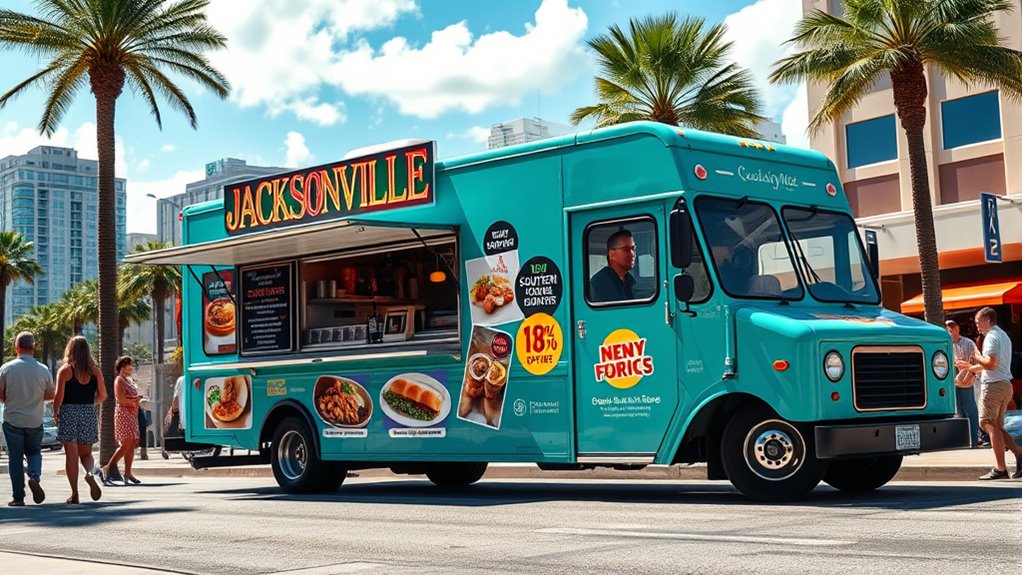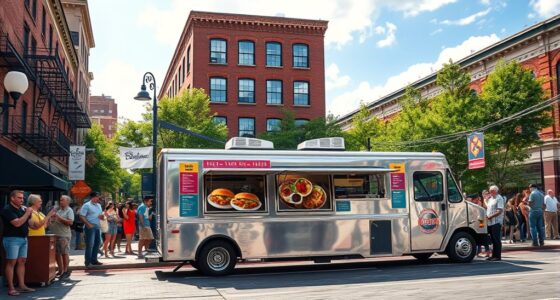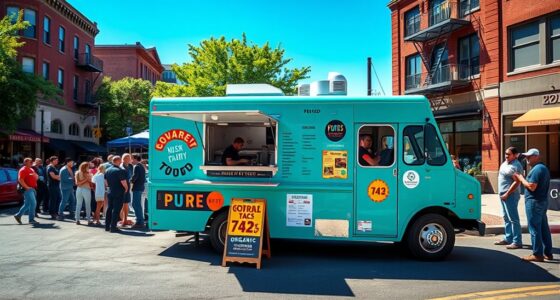To open a food truck in Jacksonville, you’ll need permits like a business tax receipt, food vendor license, and health permits, costing under $100 to around $250. Choose busy locations downtown, near parks, or beaches to attract foot traffic. Craft a menu with bold flavors, local ingredients, and trendy options. Use community events, social media, and collaborations for marketing. Ensuring compliance is key—stick to regulations, display permits, and maintain records to keep your business thriving. Keep going to discover all the details.
Key Takeaways
- Obtain necessary permits including business tax receipt, food vendor license, and health permits, with costs typically under $100 to $250.
- Prime Jacksonville locations include Downtown, University Blvd N, Mayport Rd, and busy transit hubs for high foot traffic.
- Craft a menu blending local flavors, bold spices, and trending ingredients like miso, hot honey, and plant-based options.
- Utilize local festivals, partnerships, street teams, and social media to effectively market your food truck.
- Ensure compliance by displaying permits, passing inspections, and adhering to zoning laws and health regulations.
Navigating the Permitting Process and Associated Expenses
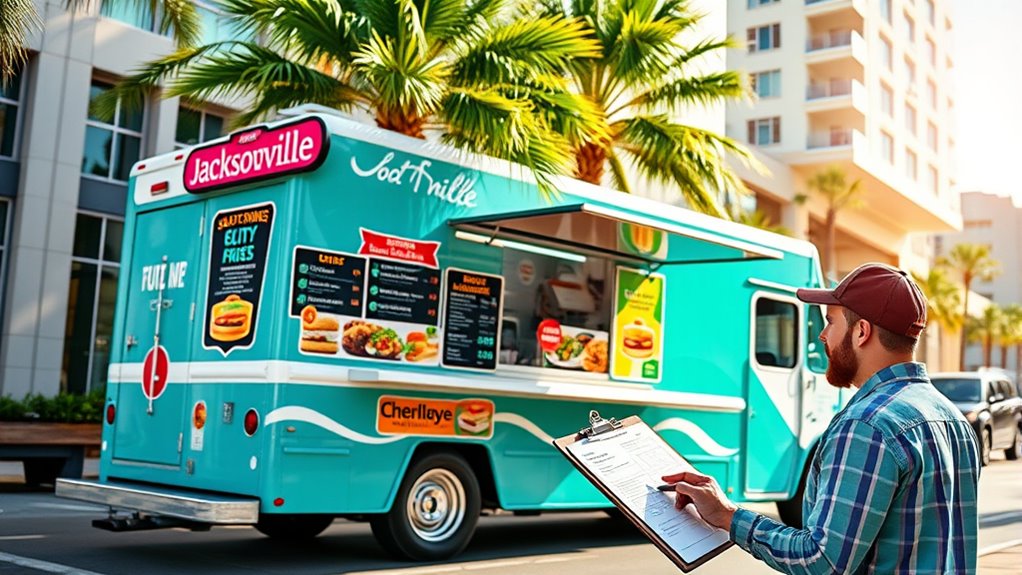
Are you ready to navigate the permitting process for your Jacksonville food truck? First, you’ll need to register your business with the Florida Department of State via Sunbiz.org, then get an Employer Identification Number (EIN) for taxes and hiring. Next, apply for a Local Business Tax Receipt from Duval County and a sales tax permit through the Florida Department of Revenue. You’ll also need a Mobile Food Service License from the Florida DBPR and a food permit from the Florida Department of Agriculture if serving raw or prepackaged foods. Expect to pay fees for each permit—typically under $100 for the business tax receipt and around $250 for the food vendor permit. Additional costs include fire safety inspections, insurance, and renewal fees, all essential for legal operation. Additionally, understanding wave and wind conditions can be crucial for planning your mobile vending schedule and ensuring safety during operations.
Prime Locations to Launch Your Food Truck in Jacksonville
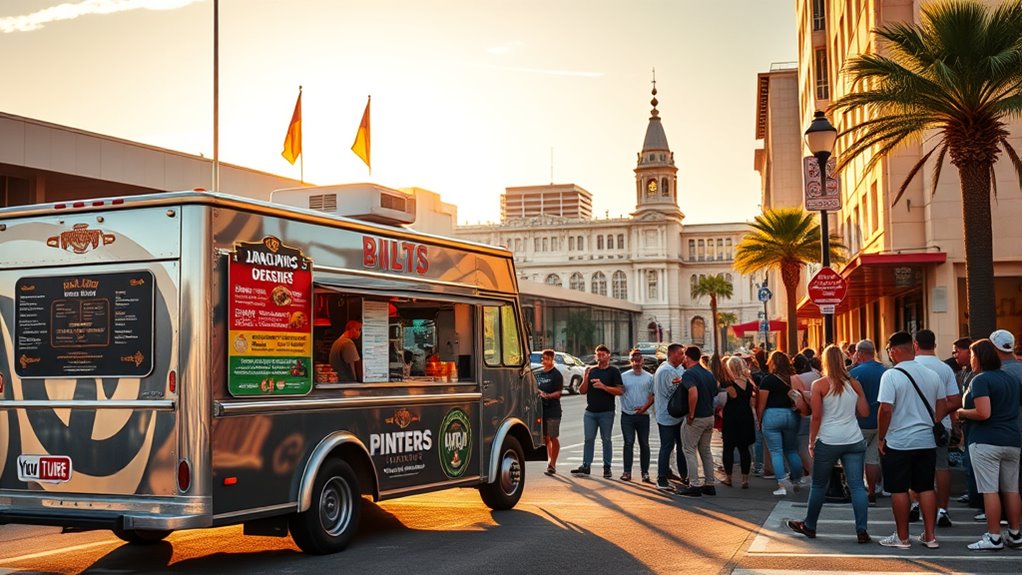
Choosing the right location is key to the success of your Jacksonville food truck. Downtown areas like 17 S Hogan St and streets near Jefferson and Adams attract office workers, courthouse visitors, and pedestrians, especially during lunch hours. Jacksonville’s ongoing revitalization boosts foot traffic, creating opportunities for weekend events and festivals. Neighborhoods such as University Blvd N, Golfair Blvd, and Main St draw local residents and families, providing steady daytime customers. Coastal spots like Mayport Rd and Renault Dr appeal to tourists and beachgoers, especially on weekends. Event venues, including stadiums and festivals, offer high-volume crowds and seasonal peaks. High-traffic hubs near transit stations, shopping centers, and corporate districts also deliver consistent exposure, making them ideal for maximizing your food truck’s visibility and sales. Incorporating nutritional information into your menu can attract health-conscious customers and set your truck apart in these busy locations.
Crafting a Menu That Appeals to Local Tastes and Trends
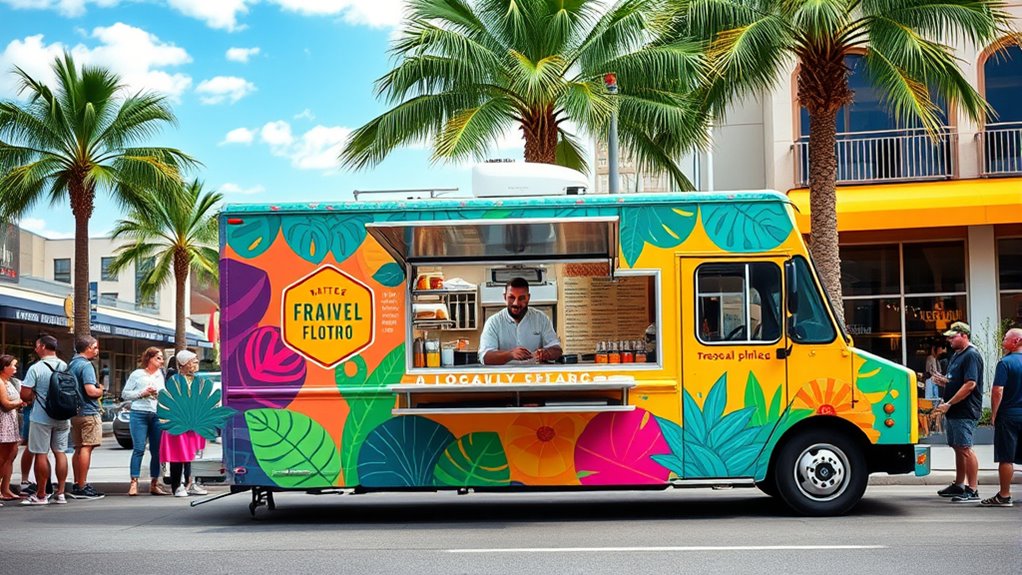
To create a menu that truly resonates with Jacksonville’s diverse crowd, it’s essential to incorporate local flavor preferences and current culinary trends. Focus on bold, spicy flavors like chili crisp and international favorites such as chicken shawarma and falafel, reflecting Jacksonville’s growing appreciation for Middle Eastern staples. Blend traditional comfort foods with innovative twists, using regional spices and sauces to keep dishes familiar yet exciting. Incorporate trending ingredients like miso, charred citrus, hot honey, and plant-based options to appeal to evolving tastes and dietary needs. Consider offering customizable, shareable dishes that foster community and engagement. Prioritize portability and ease of eating, and source ingredients locally to reduce costs and support the community. A balanced, innovative menu rooted in local flavors can attract both loyal and new customers. Additionally, Lagash Food demonstrates the success of emphasizing high-quality ingredients and precise grilling techniques to elevate familiar dishes. Understanding customer preferences through local market research can further refine your menu to meet regional demands.
Effective Marketing Strategies to Attract Customers
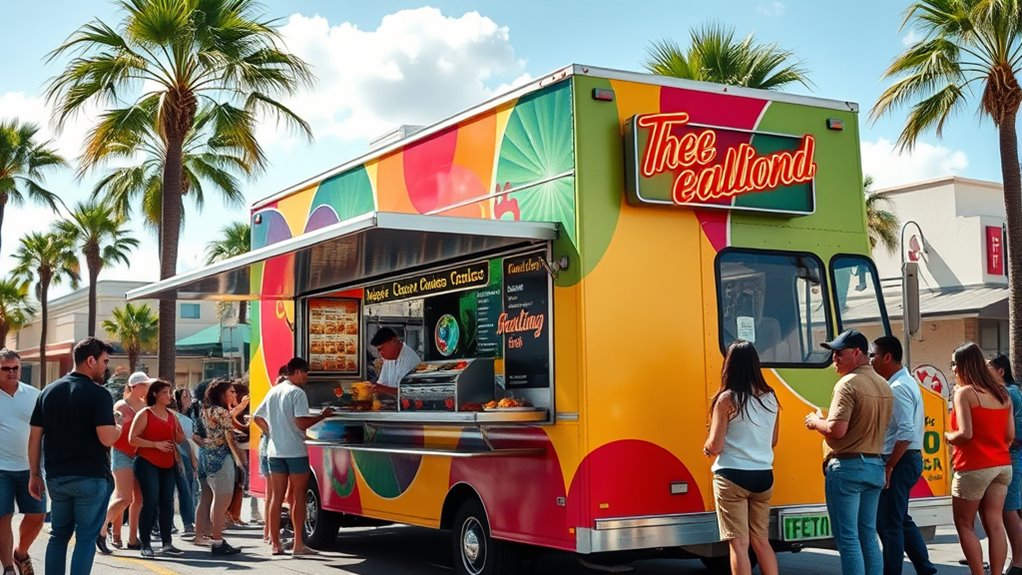
Leveraging local events and community engagement is essential for attracting customers to your Jacksonville food truck. Participate in food festivals, farmers’ markets, and community events to reach large crowds and showcase your offerings. Collaborate with nearby businesses like coffee shops and breweries for cross-promotion, expanding your reach. Deploy street teams to distribute samples, flyers, and coupons in busy areas, creating personal connections that draw customers in. Establishing a presence at popular food truck parks boosts visibility within Jacksonville’s vibrant food scene. Additionally, offering limited-time or exclusive menu items promoted at events can create excitement, encouraging repeat visits. Researching the best times and locations for these events can maximize your exposure. Incorporating effective marketing strategies such as social media campaigns and targeted advertising will further enhance your visibility. Combining these efforts with active social media promotion guarantees your brand stays top of mind, helping you attract and retain loyal customers.
Ensuring Compliance and Operational Best Practices
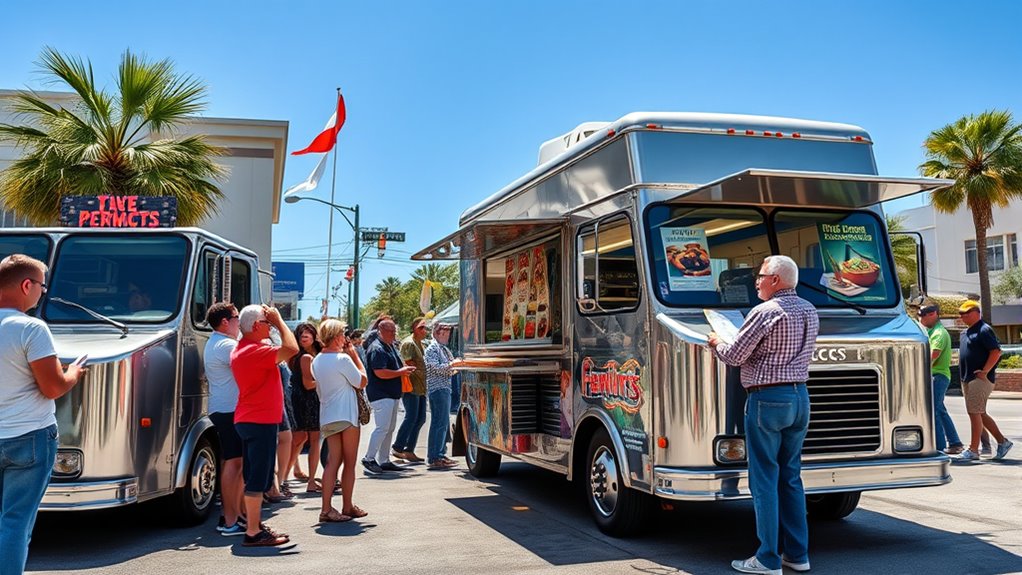
Ensuring compliance and following operational best practices are essential for running a successful food truck in Jacksonville. You must display valid Florida permits and a local business tax receipt, which cannot be replaced by city permits since 2020. Before starting, you’ll need a Jacksonville Fire Prevention Office inspection, and all permits and receipts must be clearly visible on your vehicle. Maintain compliance with Duval County zoning laws and state licensing requirements, including DBPR licenses. To avoid violations, don’t park within 100 feet of brick-and-mortar eateries or outdoor dining areas. During operations, at least one person must hold a certified Food Protection Manager credential, and you’ll need a commissary agreement for food prep and storage. Regular inspections and strict waste management are crucial to keep your food truck compliant and operational. Permits must be renewed annually, and keeping detailed records of inspections and licenses helps prevent violations and fines. Additionally, understanding regulatory compliance ensures your business remains in good standing and avoids costly penalties.
Frequently Asked Questions
What Are the Best Times of Day to Operate in Jacksonville?
You should operate during Jacksonville’s peak meal times, like lunch from 11 a.m. to 2 p.m. and dinner from 5 p.m. to 8 p.m., when foot traffic is high. Weekday evenings and weekends also attract more customers, especially near residential areas, parks, and special events. Avoid operating outside regulated hours, like before 6 a.m. or after 3 a.m., to stay compliant and maximize your sales during busy periods.
How Do Weather Conditions Affect Food Truck Business in Jacksonville?
Weather in Jacksonville can make or break your food truck business like a rollercoaster ride with sudden drops and climbs. Rainy days can wipe out crowds faster than you can flip burgers, while sunny weather can flood your sales like a tidal wave. Storms and hurricanes may force you to shut down unexpectedly, and humidity challenges spoil your food if you’re not prepared. Adapting your schedule and marketing to these wild weather swings keeps customers coming back.
Are There Specific Permits for Serving Alcohol From a Food Truck?
You can’t serve alcohol from your food truck without obtaining special permits. In Florida, you need a separate license from the Division of Alcoholic Beverages and Tobacco, and local permits are required for specific events. Generally, alcohol sales aren’t allowed through standard food truck licenses. Instead, you can partner with licensed venues or apply for temporary event permits, but selling alcohol directly from your truck isn’t permitted under normal circumstances.
How Can I Find Reliable Insurance Providers for Mobile Food Businesses?
Imagine your food truck cruising smoothly, protected from unexpected bumps. To find reliable insurance providers, focus on those specializing in mobile food businesses, offering tailored coverage for risks like accidents or equipment damage. Use online platforms like FLIP for quick quotes or contact local agencies such as Varsity Insurance in Jacksonville. guarantee they provide dedicated support, clear communication, and flexible policies, so your business stays covered as you grow and explore new routes.
What Are Common Challenges Faced by Food Truck Owners in Jacksonville?
You face several challenges as a food truck owner in Jacksonville. City regulations restrict where you can operate, especially banning sales at gas stations, and impose hefty fines for violations. Limited permitted locations make it hard to reach customers, and compliance costs add financial strain. Additionally, safety concerns and legal hurdles complicate your operations, while competition and local policies often favor brick-and-mortar restaurants, making growth and profitability more difficult.
Conclusion
Now that you know the ins and outs of opening a food truck in Jacksonville, Florida, it’s time to take action. Stay savvy with permits, pick prime spots, craft crave-worthy menus, and create engaging marketing. With careful planning and consistent compliance, you’ll conquer the community and carve out your culinary corner. Remember, persistence and passion propel your food truck dreams forward—so start strong, stay strategic, and serve up success in Jacksonville!
